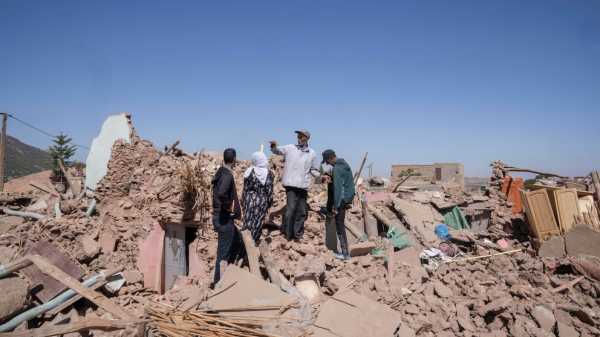
TAFEGHAGHTE, Morocco — Survivors with shovels worked alongside bulldozers Monday to dig through remote Moroccan villages flattened by a monstrous earthquake, as hope dwindled of finding people alive under wood-and-dirt homes that pancaked into rubble and rescuers overseas waited for Morocco to let them help.
More than 2,400 were killed when the quake struck late Friday — the strongest in the North African country in more than a century.
A French aid group that specializes in locating people trapped under debris said it is withdrawing an offer to send a nine-person search-and-rescue team after waiting without success for a green light from Morocco to deploy. Rescuers Without Borders' founder, Arnaud Fraisse, told The Associated Press that "our role is not to find bodies.”
Because homes in quake-hit areas were often made of mud bricks with roofs of wood, stone and clay, he said, the hope of finding survivors at this point is slim.
“When all of that collapses, you don’t have much chance of surviving, because there are no air pockets,” Fraisse said — a contrast to places where buildings are made of concrete or other strong materials. “People are generally suffocated by the dust."
Moroccan officials have so far accepted government-offered aid from just four countries — Spain, Qatar, Britain and the United Arab Emirates. Morocco’s Interior Ministry says officials want to avoid a lack of coordination that “would be counterproductive.”
The United Nations estimates that 300,000 people were affected by Friday night’s magnitude 6.8 quake, made more dangerous by its relatively shallow depth.
Most of the destruction and deaths were in Al Haouz province in the High Atlas Mountains, where homes folded in on themselves and steep and winding roads became clogged with rubble. Residents sometimes cleared away rocks themselves.
In the remote impoverished settlement of Tafeghaghte, villagers estimated that more than half of the 160 inhabitants were killed. People worked quickly to clear dead bodies, but a foul stench filled the air Monday from what residents said were dead cattle. Most buildings had disintegrated.
Ibrahim Wahdouch lost two young daughters and two other family members and likened the village to a warzone.
“There’s not shooting but look around,” he said.
Khadija Fairouje’s face was puffy from crying as she joined relatives and neighbors hauling possessions down rock-strewn streets.
On Monday, a teen carried a shovel through the rocks, bulldozers cleaned up debris and survivors steered away from half-wrecked buildings that threatened to collapse.
A day earlier, people cheered when trucks full of soldiers arrived in the town of Amizmiz, down the mountain from Tafeghaghte. But they pleaded for more help.
“It’s a catastrophe,’’ said survivor Salah Ancheu. “We don’t know what the future is. The aid remains insufficient."
Army units deployed Monday along a paved road leading from Amizmiz to remoter mountain villages. State news agency MAP reported that bulldozers and other equipment are being used to clear routes. Tourists and residents lined up to give blood. In some villages, people wept as boys and helmet-clad police carried the dead through streets.
Offers of help poured in from around the world. But Moroccan authorities frustrated some overseas rescuers who didn't want to deploy without official approval, which wasn't quickly forthcoming.
Fraisse of Rescuers Without Borders said about 100 teams — with roughly 3,000 rescuers in total — that are registered with the U.N. could have deployed quickly to the city of Marrakech that was also hit by the quake.
He surmised that Moroccan authorities may be trying to avoid the logistical chaos seen when a 2004 quake killed more 600 people and aid flights overwhelmed an airport in the disaster zone.
“Logistically, it’s extremely complicated to manage, because the rescuers then all need to be transported by truck on broken, unusable roads to the zones,” he told the AP. “So I think they didn’t want to experience again what they encountered during the last big quake.”
He said his group lodged its offer of assistance on Saturday afternoon with Morocco's Embassy in France before deciding Monday that it would no longer be of help.
“It’s their responsibility. They can do what they want," Fraisse said. “They didn’t call. So today we think it’s no longer necessary for us to go there, because we won’t do effective work."
A Spanish search-and-rescue team arrived in Marrakech and headed to the rural Talat N’Yaaqoub, according to Spain’s Emergency Military Unit. Britain sent a 60-person search team with four dogs, medical staff, listening devices and concrete-cutting gear.
But the Czech Republic was waiting for permission to sent a team of 70 rescuers. And Germany sent home more than 50 rescuers who'd been waiting to fly out, news agency dpa reported.
France, which has many ties to Morocco and said four of its citizens died in the quake, said Moroccan authorities are evaluating proposals on a case-by-case basis.
French Foreign Minister Catherine Colonna said Morocco is “the master of its choices, which must be respected.” She announced 5 million euros ($5.4 million) in emergency funds for Moroccan and international non-governmental groups rushing to help survivors. French towns and cities have offered more than 2 million euros ($2.1 million) in aid, and popular performers are also collecting donations.
Those left homeless — or fearing more aftershocks — have slept outside in the streets of the ancient city of Marrakech or under makeshift canopies in devastated Atlas Mountain towns like Moulay Brahim.
”I was asleep when the earthquake struck. I could not escape because the roof fell on me. I was trapped. I was saved by my neighbors who cleared the rubble with their bare hands,” said Fatna Bechar. “Now, I am living with them in their house because mine was completely destroyed.”
The quake had a preliminary magnitude of 6.8 and hit at 11:11 p.m. Friday, the USGS said. A total of 2,497 people were confirmed dead and at least 2,476 others were injured, the Interior Ministry reported.
Aftershocks have since hit the zone, rattling nerves in areas where damage has left buildings unstable.
Morocco’s deadliest quake was a magnitude 5.8 temblor in 1960 that struck near the city of Agadir, killing at least 12,000. It prompted Morocco to change construction rules, but many buildings, especially rural homes, are not built to withstand such tremors.
Flags were lowered across Morocco, as King Mohammed VI ordered three days of national mourning starting Sunday. But there was little time for mourning as survivors tried to salvage anything from damaged homes.
Khadija Fairouje's face was puffy from crying as she joined relatives and neighbors hauling possessions down rock-strewn streets. She had lost her daughter and three grandsons aged 4 to 11 when their home collapsed while they were sleeping less than 48 hours earlier.
“Nothing’s left. Everything fell,” said her sister, Hafida Fairouje.
___
Associated Press journalists Mark Carlson in Marrakech, Morocco; Houda Benalla in Rabat, Morocco; John Leicester, Angela Charlton, Elaine Ganley in Paris; Jill Lawless in London; and Karel Janicek in Prague contributed.
Sourse: abcnews.go.com






